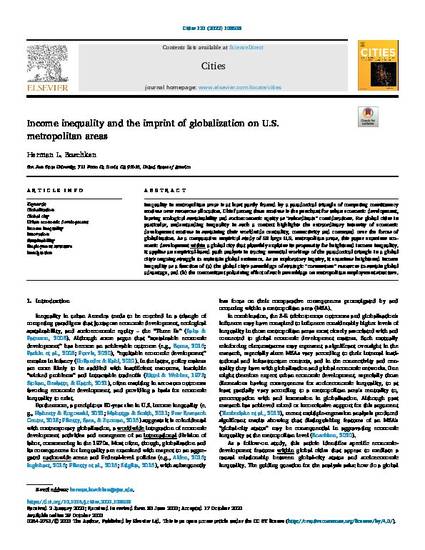
Article
INCOME INEQUALITY AND THE IMPRINT OF GLOBALIZATION ON U.S. METROPOLITAN AREAS
CITIES
(2022)
Abstract
Inequality in metropolitan areas is at least partly framed by a paradoxical triangle of competing constituency motives over resources allocation. Chief among these motives is the penchant for urban economic development, leaving ecological sustainability and socioeconomic equity as “subordinate” considerations. For global cities in particular, understanding inequality in such a context highlights the extraordinary intensity of economic development motives in sustaining their worldwide centrality, connectivity and command over the forces of globalization. As a comparative empirical study of 53 large U.S. metropolitan areas, this paper examines economic development within a global city that plausibly explains its propensity for heightened income inequality. It applies an empirical-based path analysis in tracing essential workings of the paradoxical triangle in a global city's ongoing struggle to maintain global eminence. As an exploratory inquiry, it examines heightened income inequality as a function of (a) the global city's assemblage of strategic “cornerstone” resources to sustain global advantage, and (b) the concomitant polarizing effect of such assemblage on metropolitan employment structure.
Keywords
- globalization,
- global city,
- urban economic development,
- income inequality,
- innovation,
- sustainability,
- employment structure,
- immigration
Disciplines
- Business,
- Business Administration, Management, and Operations,
- E-Commerce,
- International Business,
- Operations and Supply Chain Management,
- Organizational Behavior and Theory,
- Strategic Management Policy,
- Technology and Innovation,
- Social and Behavioral Sciences,
- Economics,
- Geography,
- International and Area Studies,
- Political Science,
- Public Affairs, Public Policy and Public Administration,
- Sociology and
- Urban Studies and Planning
Publication Date
February, 2022
DOI
https://doi.org/10.1016/j.cities.2021.103503
Citation Information
Herman L. Boschken. "INCOME INEQUALITY AND THE IMPRINT OF GLOBALIZATION ON U.S. METROPOLITAN AREAS" CITIES Vol. 121 (2022) Available at: http://works.bepress.com/herman_boschken/62/
Creative Commons license

This work is licensed under a Creative Commons CC_BY International License.
